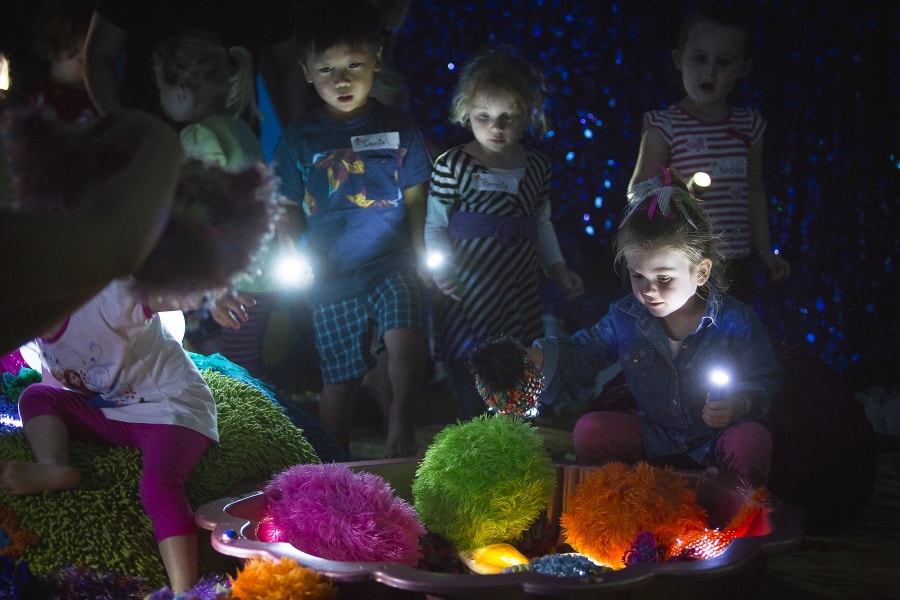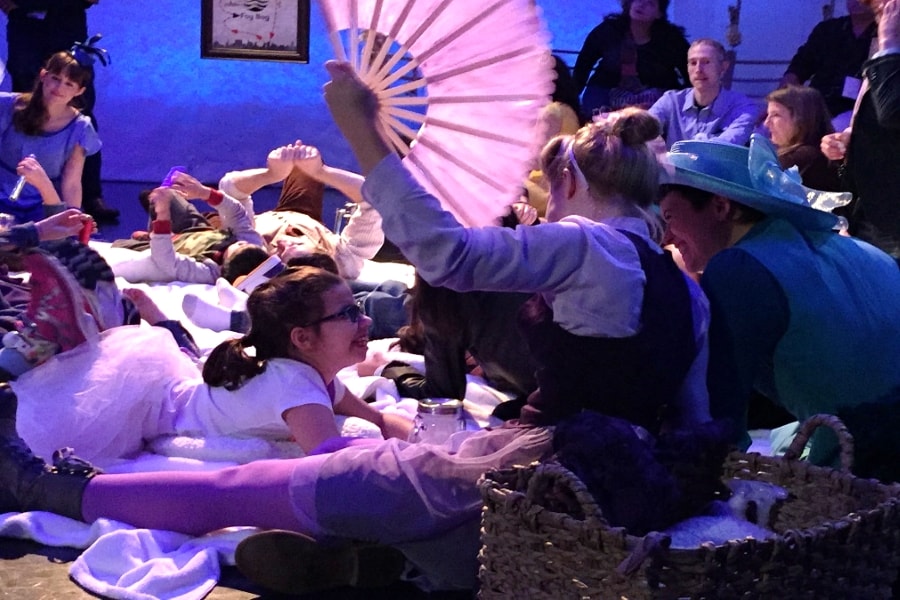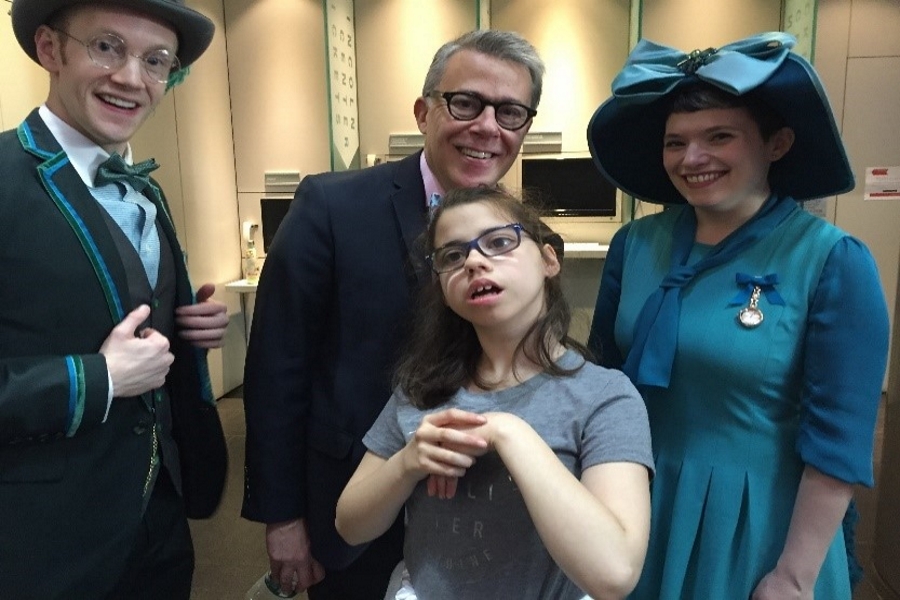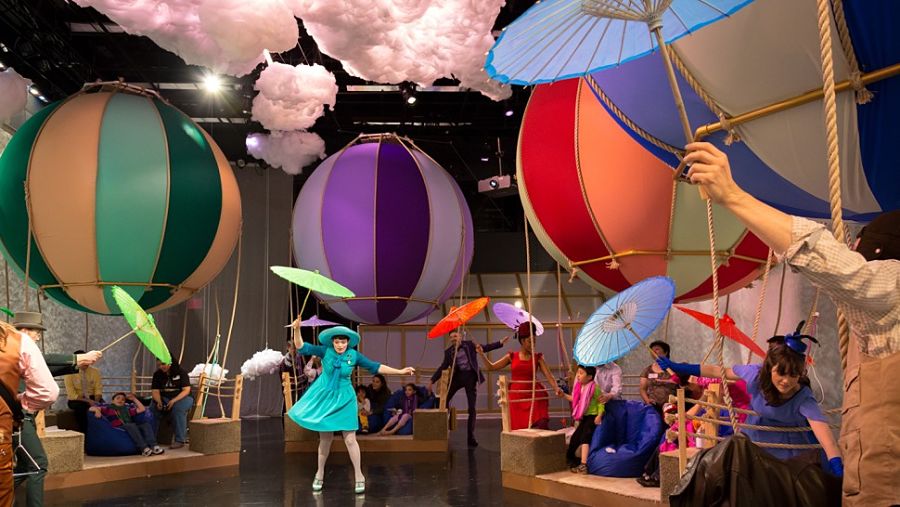A safe, welcoming, warm space. A place of understanding, sharing, and love.
On that Saturday afternoon in the fall of 2015, it was hard for my daughter and me to leave Lincoln Center after the enchanting performance of the autism-friendly Up and Away and re-enter the big bad world where most people don’t understand what it might be like to have a disabled child, or to be a disabled child.
But the two of us got to have a new, even more magical experience last April, when we attended several events during Lincoln Center’s groundbreaking Big Umbrella Festival, an international gathering of arts professionals offering performances across New York City for children on the autism spectrum. The month-long festival, which concluded in early May, was the first of its kind dedicated to presenting arts programs created specifically for young people with complex, often multiple disabilities and their families.
This ambitious project was led by Russell Granet, who had been Lincoln Center’s executive vice president of Education and Community Engagement for just three years when Up and Away, Lincoln Center’s first such production (which it had commissioned from Trusty Sidekick Theater Company) opened. Just two-and-a-half years later, one week before the kickoff of the 2018 Big Umbrella Festival, Granet was named Lincoln Center’s new acting president, a move that says a lot about the priority of education at the world’s largest performing arts center.
When he joined the company in 2012, Granet, a former teaching artist, wanted to know: If Lincoln Center is, as it bills itself, “the best of the performing arts for the broadest possible audience,” what does it mean by those last three words? His question, he said: “How do we include everyone?” With regard to the special needs community, he knew that while Broadway’s low-sensory performances and the relaxed performances being offered around the county are great, they are not for every kid on the spectrum.
During his student years at the London Academy of Music and Dramatic Arts (LAMDA), Granet had been inspired by Tim Webb, artistic director and co-founder of London’s Oily Cart theatre company. (“Oily Cart” is a play on the name of Richard D’Oyly Carte, the main presenter of Gilbert and Sullivan in the late 1800s.) Founded in 1981, Oily Cart has developed highly interactive and multi-sensory theatre for the under-five crowd. Early on they were asked to develop a piece for young people with complex disabilities, such as profound and multiple learning disabilities or autistic spectrum conditions. As Webb put it, “Theatre people love a difficult challenge. The last time someone said, ‘This is impossible,’ it led to something really good.” In reference to Pool Piece, a work Oily Cart performs in a hydrotherapy pool, Webb says, “We’ll try anything. This population of children has a great deal of emotional intelligence. It’s just a question of how to access it.”
The troupe tackled the problem of how to tell a story to audience members who often cannot remember who a character is, or what the last plot point was, with the conviction that, as Lincoln Center’s education director of programming and production, Peg Schuler-Armstrong, put it, everyone has the right to experience the benefits of storytelling and the catharsis of the live performing arts. The result has been innovative, highly personalized performance pieces that can be enjoyed equally by children with disabilities and their neurotypical families, so that the joy can be shared.

Oily Cart served as a consultant for Up and Away, which was so popular in 2015 that it was followed by another original Trusty Sidekick production, Campfire, in 2017. Up and Away was performed again for general audiences and school groups during the Big Umbrella Festival, along with two other productions: Oily Cart’s deceptively simple but creatively stimulating Light Show, and Oddysea by West Australia’s Sensorium Theatre.
Each performance of these highly specialized shows is for an audience of fewer than 10 children and their families. “There’s always going to be a waiting list,” Granet says.
Indeed the need for this kind of work is high, and part of Big Umbrella’s goal was to encourage further efforts to meet it. Today in the U.S., it is estimated that one in 62, or 1.6 percent, of children have an autism diagnosis, and the number of individuals suffering from cognitive impairment is only growing. “We are all only a few minutes of oxygen starvation away from the same fate,” Webb pointed out. The challenge becomes: How can such a large community be provided with fulfilling, individualized experiences?
“23 regional theatres came in to see Up and Away the first time,” Granet said. “People from eight countries attended the Big Umbrella Festival. To meet demand, our goal is to help other theatre companies produce this kind of work.” How will he measure success? “If every theatre does some original programming specifically for kids on the autism spectrum every year,” he said. “To that end, part of the Festival was a week-long intensive for artists, and another one for administrators.”
Jonathan Shmidt Chapman, co-founder of Trusty Sidekick and artistic consultant for the festival, moderated a panel discussion where the question of funding these important but expensive programs came up. He said that if the ratio of performer to child isn’t one to one, these shows don’t work—hardly a typical theatre business model, to put it mildly. “We have to learn how to effectively communicate our success to prospective donors without relying on numbers,” said Chapman, “which, unfortunately, is what most institutional grant-makers are looking for.”

As Granet said, “Good actors exhibit incredible empathy, and it was emphasized during the Up and Away training. Our actors are exhausted after an hour-long show, yet they won’t let the experience go, exclaiming things like, ‘Did you see how this kid’s eyes lit up?’ They are involved in the show and the audience well after the curtain comes down.”
This was confirmed by Emily Bruner, who played Faux Fogg in 2015 and again at the Big Umbrella Festival. Bruner was trained in part by Chapman, who speaks of “radical empathy” and believes that empathy cannot be taught but can be mined with tools like empathy improvisation exercises. In her early performances, the high level of identification and investment—with children, siblings, and parents—took a huge emotional toll on Bruner.
“Three times a week, I found myself weeping on the subway on the way home,” she confessed. “After the 2015 run was over, I realized that I couldn’t keep putting myself through such intense emotional experiences without taking care of myself. I needed to learn how to care for our audience members the same amount but then leave it at the door after the show is over. I needed to be armed with the ability to disconnect, which can be very difficult. I wanted to use empathy as a superpower, not as a Kryptonite.”
Now, she said, she makes a point of taking a nap after every show, indulging in relaxing baths, and drinking calming tea. She also finds support from her colleagues. “The women’s dressing room is such a supportive environment,” she said. “And the cast ends each show with a ‘compliment circle,’ because sometimes we have very difficult shows.”
Come April 14, it was time to see if the Big Umbrella Festival had the same magic that Up and Away did three years ago. My non-verbal, cognitively impaired daughter Audrey and I found our way to the cavernous David Rubenstein Atrium at Lincoln Center for the Big Umbrella Festival kickoff celebration. It was a lively atmosphere—and I feared that Audrey, who is both hyper-sensitive and hypo-sensitive, would find it overwhelming. But she spotted two old friends immediately and made a beeline over to them, rudely pushing aside anyone in her way. They were Phin and Fran Fogg, whom Audrey undoubtedly remembered from Up and Away. She stuck to them like glue until it was time for them to go onstage.

Speeches were followed by a rousing performance by Grammy-nominated singer/songwriter Brady Rymer (yes, that’s his real name) and the Little Band That Could, opening with an original song by Rymer aptly called “Under the Big Umbrella.” The children loved the music and the parents got a kick out of all the rhymes Rymer found for “umbrella,” including “fella,” “bella,” “mozzarella,” “tarantella,” and “a capella.” What fun!
After lunch and a visit to the beautiful Revson Fountain, we had the pleasure of hearing the Actionplay Chorus sing in the Atrium. This group, comprising of teenaged performers on the autism spectrum, some of whom are non-verbal, performs all original songs, accompanied by professional musicians. We were tickled and touched by songs with such titles as “New York City Overload,” “Sur-reality TV,” and “Superpower Song.” Their self-confidence and enthusiasm were infectious, and we left thoroughly inspired.
Next it was onto the seventh floor of the Rose Building for Oily Cart’s Light Show. The production featured a set, costumes, and props almost entirely of white, which was perfect for someone like my daughter, who has ADD and is easily distracted. Adam Storey (“Russtle”) played the upright bass and accompanied the action perfectly, even imitating the sounds of seagulls on the beach, the setting for the show. Movement and text were minimalistic, with simple acts like opening a hand fan done so slowly that the children had the time to process what was happening. At one point, my daughter jumped out of her seat and followed the actors across the playing area to behind the screen, “backstage.” Mortified, I ran after her, but the bass player, Storey, said to me quietly, “It’s okay. She can go.” Really?! I gently guided her back to her seat, although she remained standing.
Four of our five senses were stimulated during the course of the hour. (We didn’t taste anything.) The only part of the show that concerned me was when the actors, who had donned deep purple rain-cloud hats, gently spritzed the area above the audience with squirt bottles so we could feel the mist as it fell. Audrey sat back down, grimaced, blinked repeatedly, and recoiled. But she recovered quickly once the “storm” cleared.
When we got home, something extraordinary happened: Audrey surprised me by grabbing a spray bottle on our kitchen counter and playfully squirting me. Because Audrey is non-verbal, I have never been able to get any response from her after a show aside from a quick “yeah” when I asked if she liked it. It was a huge breakthrough for her to imitate a simple gesture she’d seen onstage. All of the other productions we’ve attended together over the years had been too complex for her to try to reproduce in any way at all. We both laughed with delight as we “relived” the rainstorm. (And then I told her to stop squirting me with Windex.)
It had been a three-show day for us, and we both loved every minute of it. The following week, the individuals participating in the professional development tracks attended seminars, and on Thursday we all came together for a day-long forum. There were two rich panel discussions, followed by a presentation broadcast on Facebook Live. I was awed that Temple Grandin’s 91-year-old mother, Eustacia Cutler, was in attendance. Cutler has done so much for the disabled community and human rights, well before “autism” was the buzzword it’s become.
We often see that people contribute generously or get involved in the cause of fighting or mitigating an illness when they have a loved one who’s affected by it. I asked Granet, Webb, and Bruner if they had any family members with autism, and they each responded no. Granet stated his strongly held conviction that disabled folks have the right to experience the same benefits of education and culture as the able-bodied and neurotypical populations. His comment brought to mind the popular image demonstrating “Equality vs. Equity”: Some members of our community simply need more help than others, and it’s our duty to provide it.
During the presentation, I almost had to leave the room when Maria Rocio Galarza, assistant vice president, U.S. Social Impact for Sesame Workshop, spoke about the newest resident of “Sesame Street,” Julia, who is on the autism spectrum. My eyes filled with tears as I learned how Julia can help other children be more accepting of kids with neurological and developmental differences like the ones that too often marginalize children like my daughter.
Our final experience with the festival was on its closing day, Sunday, May 5, when we attended a workshop at the New York City Ballet led by teaching artist Jennifer Tinsley-Williams, accompanied by pianist Lou Shih and assisted by four friendly students from the American School of Ballet. Back on the seventh floor of the Rose Building, we were reunited with many of the new friends we’d made during the course of the festival. Having come to the end of such an extraordinary program, we were all rather emotional. I was told that the folks at Lincoln Center Education are thinking about hosting a similar festival every two years.
I certainly hope they do. Odette Adrian, who attended the City Ballet workshop with her daughter Annika, remarked, “How great it is for kids with special needs to be in a comfortable, non-judgmental space where they are encouraged to express themselves in whatever way works for them versus how they are seen by the outside world, which views and defines them primarily by their intellectual disability.”
Another parent posted on Instagram (#bigumbrellafestival) after seeing Up and Away: “Thank you all for this extraordinary show! You are collectively and individually a glowing ball of shimmering goodness and phenomenal talents.”
Amen to that.
Lisa Lacroce Patterson is a freelance writer who has also worked as an arts administrator for 30 years.


